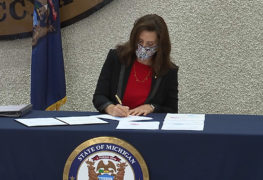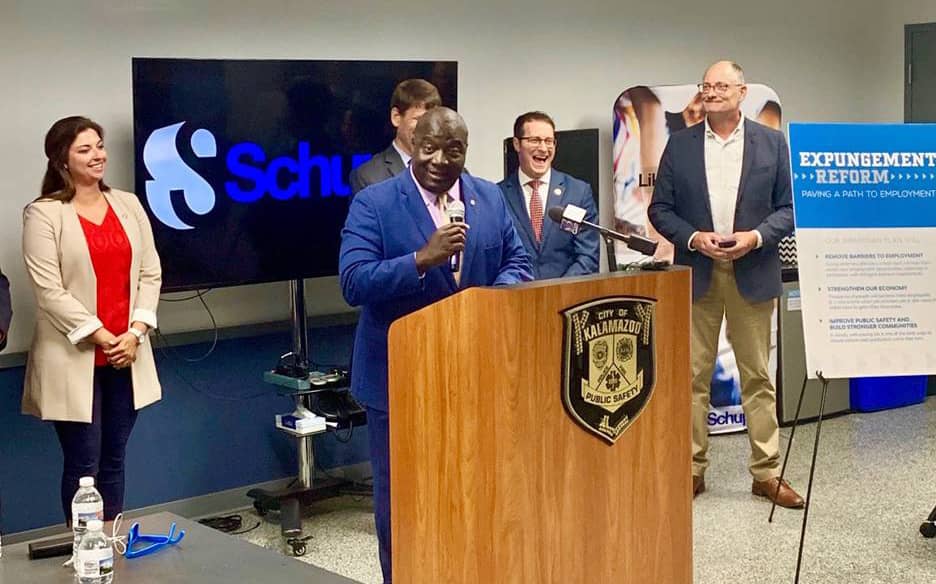“Common sense legislation” designed to do what’s right finally achieved a hard-earned signature from the governor today, as State Representative Pauline Wendzel and colleagues crossed the finish line with an historic package of bills making Michigan a national leader in expungement policy.
Today, after more than a year of hard work, stakeholder meetings, and multiple House and Senate Committee hearings, the bipartisan legislation she was a primary sponsor of was signed into law by Gov. Gretchen Whitmer.
Wendzel says, “This common-sense legislation is about doing the right thing.” She was a primary sponsor who helped shepherd the bill through the House and Senate, and adds, “Removing barriers so every Michigander can rise to their full potential and support their families is one of the most important things we can do as a state. After a year of hard work, we came together, Republicans and Democrats, and delivered real and meaningful criminal justice reforms to the people of Michigan.”
Rep. Wendzel continued: “This historic legislation is arguably one of the most important legislative packages passed in the last decade. By allowing hundreds of thousands of Michigan residents who made a mistake and paid their debt to society to have low-level offenses removed from their record, we’re opening the door to new and better career, educational, and housing opportunities. This not only reduces recidivism, but it helps our community and our economy grow in a safe and healthy manner.”
Data from the University of Michigan has revealed three key findings as it relates to the expungement or set-asides of criminal records. First, of those legally eligible for expungement, just 6.5-percent obtain it within five years of becoming eligible. Second, those who do obtain expungement have extremely low subsequent crime rates. That finding defuses a common public-safety objection to expungement laws. Third, those who obtain expungement experience a sharp increase in their wage and employment trajectories; on average, within two years, wages go up by 25-percent versus the pre-expungement trajectory, an effect mostly driven by unemployed people finding jobs and under-employed people finding steadier and higher-paying jobs.
Wendzel says, “In Michigan, we’re working together to reform a broken system and make our criminal justice system more fair for all of our residents,” and concludes, “I’m proud to have supported bipartisan reforms to our civil asset forfeiture procedures, reforms to our juvenile justice system, reforms to mandatory minimum sentencing, reforms to our licensing requirements, and so much more. In an era of hyper-partisanship, we truly are working together in Michigan to improve the lives of the people we serve.”
In the photo accompanying this story on Moody on the Market, you find State Rep. Pauline Wendzel, David LaGrand, Graham Filler, and Eric Leutheuser listening as former Kalamazoo Mayor Bobby Hopewell voices his support for the bipartisan criminal justice reform package unveiled in Kalamazoo more than one year ago.
As she signed the bipartisan legislation today, Governor Gretchen Whitmer said, “This is a historic day in Michigan. These bipartisan bills are a game changer for people who are seeking opportunities for employment, housing, and more, and they will help ensure a clean slate for hundreds of thousands of Michiganders,” while adding, “This is also an opportunity to grow our workforce and expand access to job training and education for so many people. I am proud to sign these bills today alongside Lieutenant Governor Gilchrist and many of the bipartisan leaders who worked on them.”
House Bills 4980-4985 and 5120 reform Michigan’s criminal expungement laws making it easier for people who have committed certain felonies and misdemeanors to have their record expunged. Changes in the bills include allowing a person to set aside one or more marijuana offenses if the offense would not have been a crime if committed after December 6, 2018 when recreational marijuana use by adults became legal in the state, due to the referendum that voters approved to legalize marijuana in 2018. During her 2018 campaign for governor, Governor Whitmer made expungement for marijuana convictions one of her key priorities, and said today she is following through on that promise.
Lieutenant Governor Garlin Gilchrist II says, “This anti-poverty, pro-job opportunity Clean Slate legislation will reinvigorate the economic potential of hundreds of thousands of Michiganders whose records have hindered their availability to get a job or secure housing, and it will help us grow our workforce,” adding, “This is the right thing to do on behalf of people everywhere who deserve another chance, and will help improve livelihoods. There is more work to do, but Michigan has now established itself as a leader in removing barriers to economic opportunity for people who have made mistakes. I will continue to stand tall for Michiganders across the state who need someone in their corner.”
The changes proposed by House Bills 4980-4985 and 5120 include the following:
- Creates an automatic process for setting aside eligible misdemeanors after seven years and eligible non-assaultive felonies after 10 years.
- Expands the number and revises the types of felonies and misdemeanors eligible to be set aside by application.
- Revises the waiting periods before being eligible to apply.
- Treat multiple felonies or misdemeanor offenses arising from the same transaction as a single felony or misdemeanor conviction, provided the offenses happened within 24 hours of one another and are not assaultive crimes, or involves possession or use of a dangerous weapon, or is a crime that carries penalty of 10 or more years in prison.
- Expands expungement eligibility to various traffic offenses
- Allow a person to petition to set aside one or more marijuana offenses if the offense would not have been a crime if committed after the use of recreational marijuana by adults became legal in the state.
Detroit Mayor Mike Duggan says, “Thousands of Detroiters who want to work and be a part of Detroit’s comeback have been held back for too long because of mistakes they’ve made in their past,” and adds, “Thanks to the Governor and our state Legislators, more than 80,000 more Detroiters now will be eligible to have those past mistakes removed from their record and a chance at a new start. Detroit’s Project Clean Slate has helped hundreds of people get their records expunged already. It’s free, helps clients through the entire process and connects them to opportunities through Detroit At Work.”
House Speaker Lee Chatfield, notes, “Everyone deserves the chance to build a good life for themselves and their families. But far too many people enter the criminal justice system and end up cut off from those opportunities and are pushed toward a cruel cycle of poverty and crime. That’s not right, and it creates bad outcomes for all of us,” and adds, “These bills are an important step to righting that wrong and helping good people who’ve paid their debt get back on their feet. I am glad we were able to find common ground on this important issue and deliver reform that will help people statewide.”
Representative David LaGrand, a Grand Rapids Democrat says, “With the signing of these bills, Michigan becomes a national leader in empowering citizens to lead productive lives,” and concludes, “Michigan will be the first state in the nation to expunge some felonies automatically. I have planned to do everything I can to encourage other states to follow Michigan’s lead.”
Safe & Just Michigan Executive Director John S. Cooper says, “This is a milestone in state criminal record-sealing policy that will help hundreds of thousands of people in Michigan and help drive the national conversation on reform forward,” and adds, “Safe & Just Michigan is grateful for all the hard work of Governor Whitmer, Lieutenant Governor Gilchrist, reform advocates, Clean Slate’s legislative champions, and other supporters over the last two years to make this day possible.”






